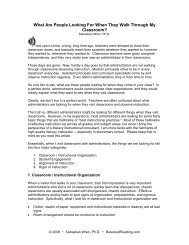The Abecedarian Reading Assessment - Balanced Reading
The Abecedarian Reading Assessment - Balanced Reading
The Abecedarian Reading Assessment - Balanced Reading
You also want an ePaper? Increase the reach of your titles
YUMPU automatically turns print PDFs into web optimized ePapers that Google loves.
Decoding<br />
Young children easily learn to associate whole words with concepts or ideas – at this early<br />
stage in reading development, children can “recognize” familiar words, but that does not<br />
necessarily mean they are “decoding” them. Decoding words involves sounding them out<br />
and arriving at a pronunciation that other mature readers agree with. Furthermore, that<br />
decoding process should not be laborious – not if the child is going to be a successful<br />
reader. Successful readers can very quickly and easily pronounce written words. Skilled<br />
readers (college level students) can recognize words in less than one-fifth of a second.<br />
<strong>The</strong>y recognize words so easily and automatically, they cannot help but decode words that<br />
are put in front of them. Young children cannot identify words so quickly, but they should be<br />
able to identify a word in less than a few seconds.<br />
When children spend so much of their energy concentrating on sounding out words in text,<br />
there is nothing left over to concentrate on meaning and understanding. Decoding must be<br />
fluent and automatic so that comprehension will not suffer.<br />
Furthermore, at least in English, sometimes sounding out words is not sufficient. Some<br />
words in English are not “spelled the way they sound.” That is, they have irregular<br />
spellings – “one” does not rhyme with “bone” or “gone” (which don’t rhyme with each other).<br />
Arguably, it rhymes with “done,” but where does the /w/ sound come from?<br />
To be successful readers of English text, children must be able to quickly identify both<br />
regular and irregular words. Thus, there are three tasks in the Decoding subtest: Fluency,<br />
Regular Words, and Irregular Words. A child that quickly and easily reads the words in the<br />
Fluency task does not need to be tested with the other two tasks. Children who struggle<br />
with the words in the Fluency task, however may at least need to be tested with the<br />
Regular Words task (depending on the frustration level of the child). <strong>The</strong> words chosen for<br />
the tasks in this subtest were drawn from two databases that list words according to how<br />
often they come up in speech or text (called the Word Frequency) and according to how<br />
early in life most people learn the words (called the Age of Acquisition).<br />
Children who perform well on this task do not need to take any of the more basic<br />
assessments – teachers may wish to use this assessment as a screen to make<br />
assessment more efficient.<br />
Children who are having difficulty with this task, however, need more instruction in the<br />
patterns that exist in English text. First children learn how to sound out regular words, then<br />
they learn how to correctly pronounce irregular words. So emphasizing the regular patterns<br />
is most beneficial for students struggling to decode words. For ideas about instructional<br />
activities that could be used to help children develop letter knowledge, consult<br />
www.balancedreading.com. Also, Patricia Cunningham has a series of books available<br />
that provides very effective lessons for helping children to detect the patterns in the English<br />
writing system. Check out Making Words, Making Big Words, and the wonderful book<br />
with the unfortunate title, Phonics <strong>The</strong>y Use.<br />
<strong>Abecedarian</strong> <strong>Reading</strong> <strong>Assessment</strong> • www.balancedreading.com • Page 29<br />
Decoding



